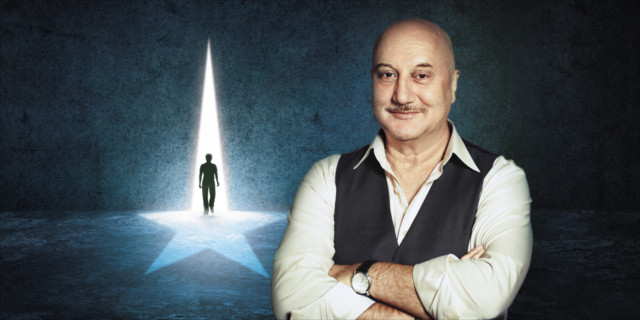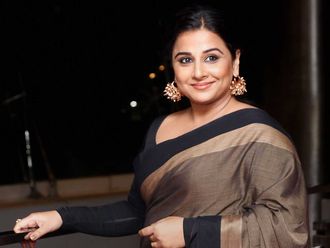
With his second film Saaransh (1984), actor-director-teacher Anupam Kher set standards in the Indian film industry. But in a role which 20-something new actors (as he was then) wouldn’t touch with a bargepole: playing a man at least 30 years older than his actual age. The performance fetched him the year’s Filmfare Award for Best Actor.
Though there were no lead roles for him, Kher’s versatility as an actor comes through in award-winning, supporting characters in films such as Ram Lakhan, Khel, Darr, Lamhe and Dilwale Dulhaniya Le Jayenge. He has twice received the Special Jury National Film Award for his performances in Daddy (1989) and Maine Gandhi Ko Nahin Mara (2005).
He turned director with Om Jai Jagdish and founded the acting academy, Actor Prepares, which has actors such as Preity Zinta, Mughda Godse and Ali Zafar as alumni.
With such a fruitful career, the only next best thing to do was to become a source of inspiration. Kher wrote and starred in a play about his life called Kucch Bhi Ho Sakta Hai. Based on this, he created a TV show which went on air last month, featuring the journey of superstars.
“The Anupam Kher Show — Kuch Bhi Ho Sakta Hai is all about motivation, inspiration, patience and the possibility of kuch bhi ho sakta hai [anything can happen] in anybody’s life,” said the multi-faceted actor who will present a glimpse of the show at an invitation-only event on Wednesday at Jumeirah Beach Hotel in Dubai.
What’s different
But it’s not the first time that such a show is on air. We’ve had highly popular shows such as Jeena Isi Ka Naam Hai presented by the late Farooque Shaikh or Karan Johar’s Koffee With Karan. So, what can the audience expect different?
“It’s not an interview per se. It’s a chat. It could have been in my drawing room, a restaurant or a corner somewhere. We only see the glamour side of stars but not how they’ve achieved it. So, this is an attempt to revisit who they are. [My guests] share personal issues because of their trust in me, because of the years of work I’ve put in the industry and my relationship with them. It has a lot to do with my own life, how with great difficulty I’m where I am. Similarly, all people I’ve spoken to — whether it’s Naseer [Naseeruddin Shah] or Om Puri, whether it’s Mahesh Bhatt or Akshay Kumar, Shah Rukh Khan or Yuvraj Singh — when you listen to people’s lives and how they’ve made it, it becomes inspirational for the audience.”
Kher hails from the prestigious National School of Drama (NSD) which has given actors of such calibre as Shah, Puri, Irrfan Khan and Pankaj Kapoor. At the time he entered the industry, NSD graduates were known to be better actors in comparison to mainstream commercial actors. Today, you’d find few actors stepping out of professional courses. Yet, Kher maintains they are not lacking.
“Today, people who want to join acting school are already very aware of the kind of information and the various courses available to them. A 12-year-old boy is worth a 25-year-old man of say 10-15 years ago. Now, you are not working on a person’s confidence level, but his or her skills. Of course, training does help, but it also depends on one’s inclination to learn. You may be in a medical or engineering college but not all will stand first in class. It depends on who studies the most. Similarly, in an acting school, say in a 30-student class, only four or five have become what they aspired to be. I think directors today take a lot of training workshops too. The whole system has changed. You don’t land up at the shooting straight away.”
At the same time, Kher is not averse to the idea of an actor donning several hats as opposed to roles in yesteryear films.
“I think it’s fantastic. When an actor is not restricted to any particular emotion, [he can] probe into all kinds. That is important and that’s how it should be done. And why not? Times are changing. Earlier, mothers used to stay at home and fathers went to work. Now, mothers are doing interviews. We should move with the times. It’s a good change.”
International films
Speaking of change, Kher didn’t miss the opportunity to explore international projects at a time when Indian stars weren’t comfortable to step out of the industry. From Bend It Like Beckham to Bride & Prejudice to the 2013 blockbuster Silver Linings Playbook, Kher says there isn’t much difference in the work ethic today.
“Initially, when I started doing international films with Bend It Like Beckham, I felt a lot of differences, but now in the past seven-eight years, it has narrowed down greatly. We are equally professional, especially with corporates coming into the industry.”
So having delved into almost all aspects of the industry, how would he describe himself as an actor, director-producer, mentor and family man? “I don’t categorise my life into different sections,” said Kher. “In every role that I do — whether I’m a teacher, actor or mentor — I do it with total dedication and as much honesty as I feel is required because there’s no alternative to honesty and hard work. It has been a fantastic journey. God has really been kind to me. I’ve done 480-odd films, have my own acting school, won awards, etc. and now host a successful TV chat show — what else can I ask for? Yes, of course, every journey has its ups and downs but that’s part of life. I feel I’ve only reached the interval and when you ask me this question 30 years later, I think I’ll be able to do a summing up of my life.”
So, what can we expect from Anupam Kher next? “Kuch bhi ho sakta hai!”
Quote/unquote
“The best part about today’s generation [of actors] is they are all very dedicated, hardworking people because there’s a lot of competition around. I think Ranbir Kapoor, Parineeti Chopra and Aditya Roy Kapoor are very good. I don’t think it’s fair on my part to single out one or two people. I think everyone has done a great job in a lot of films. Also, you are known only by your last film today. Earlier, acting was more relaxed, in the sense you could make 9-10 [failed] films and still the people gave you another chance.”











